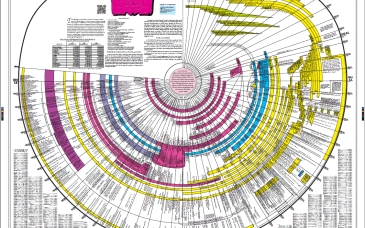
Included here are articles that deal with aspects of specific Old Testament Books or passages, but this does not include Lectionary Commentary articles. For more general articles on the Old Testament, see Bible Topics, Issues in Biblical Interpretation, Biblical Theology, The Bible in the Church, and Historical and Cultural Context of Scripture. See also the Text Index for commentary, sermons, and articles on specific passages, as well as Bible Short Topics for brief articles on various aspects of the Old Testament.
These are short articles providing summary information on the books of the Old and New Testaments. Some of these are only content outlines, while others give brief information about the biblical books. In some cases, there will be links to more detailed articles and information.
Genesis, Exodus, Leviticus, Numbers, Deuteronomy
Former Prophets: Joshua, Judges, 1-2 Samuel, 1-2 Kings
Latter Prophets: Isaiah, Jeremiah, Ezekiel, The Book of the Twelve
Psalms, Proverbs, Job, Song of Solomon, Ruth, Lamentations, Ecclesiastes, Esther, Daniel, Ezra, Nehemiah, 1 -2 Chronicles
See also: Old Testament History - Israelite Kings Date Chart - OT Prophets Date Chart
Key Biblical Dates - The Bible's Storyline
- The Patriarchal Era (1800-1290 BC)
- Exodus and the Period of the Judges (1290-1050 BC)
- Early Israelite Monarchy (1050-750 BC)
- The United Kingdom
- Saul (1029-1000)
- David (1000-961)
- Solomon (961-922)
- Rebellion of the North and Its Aftermath
- The Southern Kingdom
- The United Kingdom
- Assyrian Dominance (750-605 BC)
- The Rise of Assyria
- The Last Days of the Northern Kingdom
- Zechariah (746-745) and Shallum (745)
- Menahem (745-737)
- Pekahiah (737-736)
- Pekah (736-732) and the Syro-Ephraimitic coalition
- Hoshea (732-724) and the End of the Northerm Kingdom
- The Assyrian Crisis and the Southern Kingdom
- Jotham (coregent, 750-742; king, 742-735)
- Ahaz (735-715)
- Hezekiah (715-687)
- Manasseh (687-642)
- Amon (642-640)
- Babylonian Era and Exile (605 BC - 538 BC)
- Waning Assyrian Power
- Josiah (640-609) and Religious Reforms
- Jehoahaz (609)
- Babylonian Control of Judah
- Jehoikim (609-598)
- Jehoichin [Jeconiah] (598)
- Zedekiah [Mattaniah] (598-587) and the End of Judah
- The Fall of Jerusalem and Its Aftermath
- The Peak of Babylonian Power
- Waning Assyrian Power
- The Persian Period and Return from Exile (538-323 BC)
- The Decline of Babylon
- Cyrus and the Rise of Persia
- Persian Rule and Return from Exile
- The Leadership of Ezra and Nehemiah (not completed)
- The Greek Wars/Maccabean Period (323-63 BC)
- The Rise of Rome (63-3 BC)
See also PhotoTour for photos and maps that relate to the cultural and historical background of Scripture.
